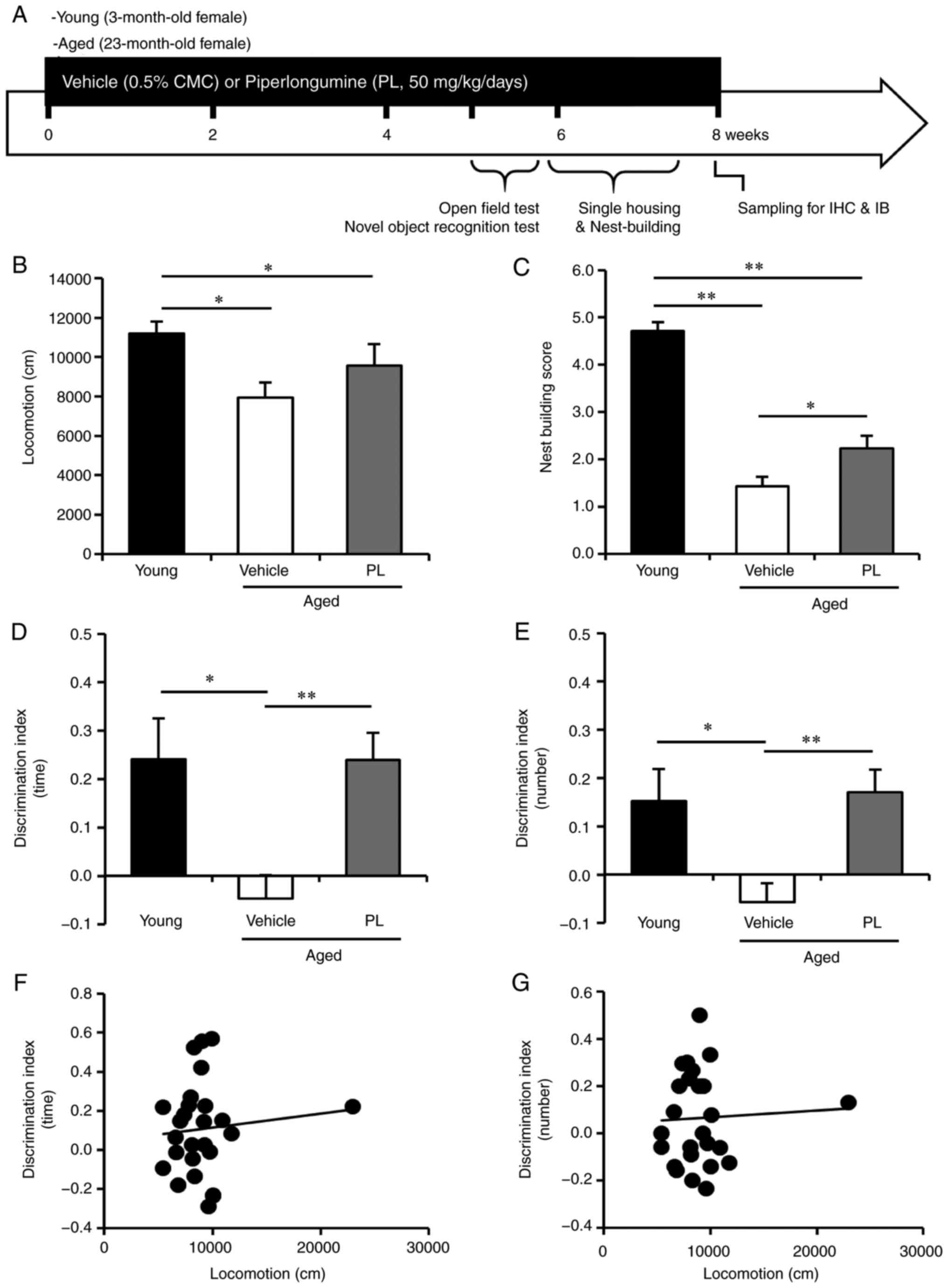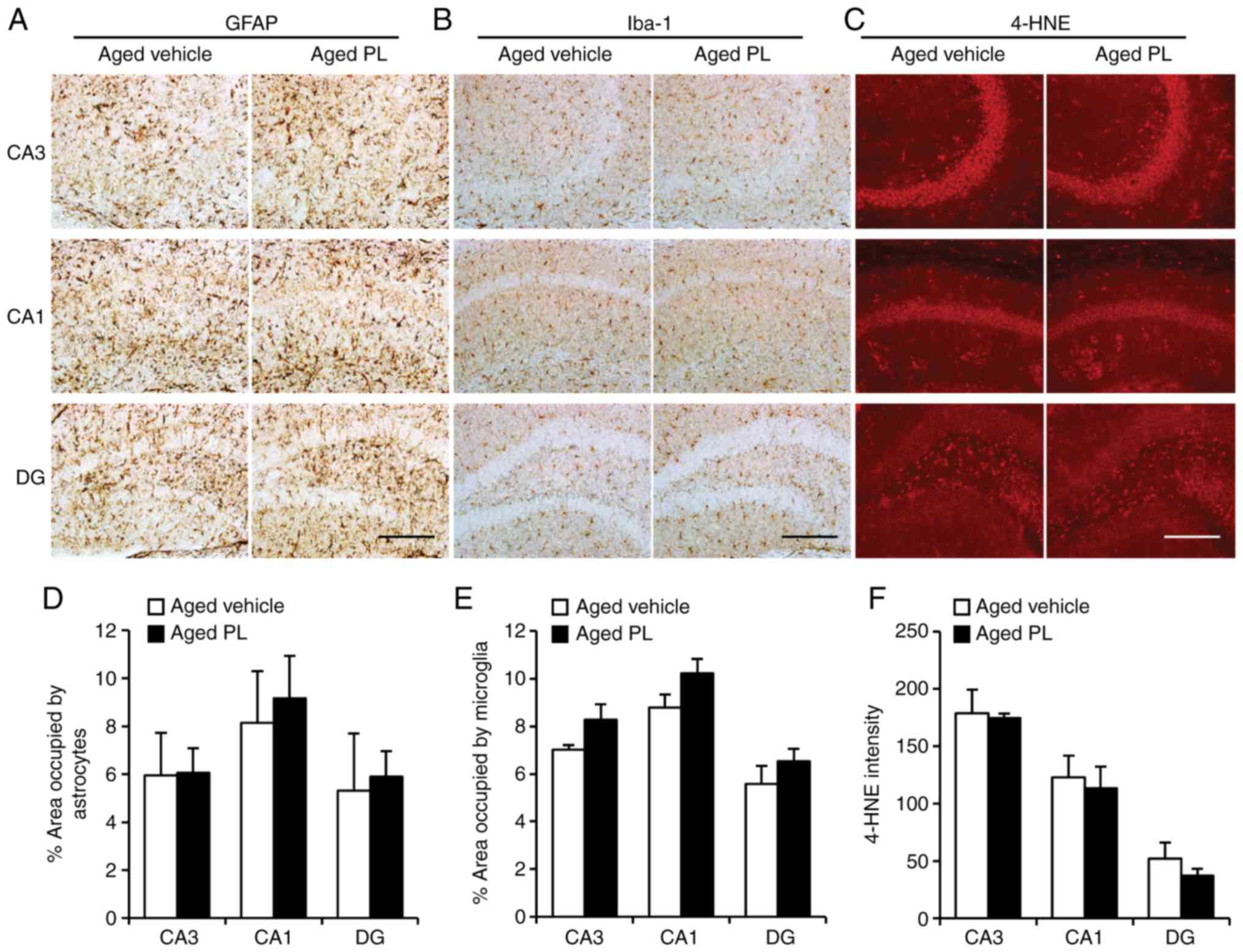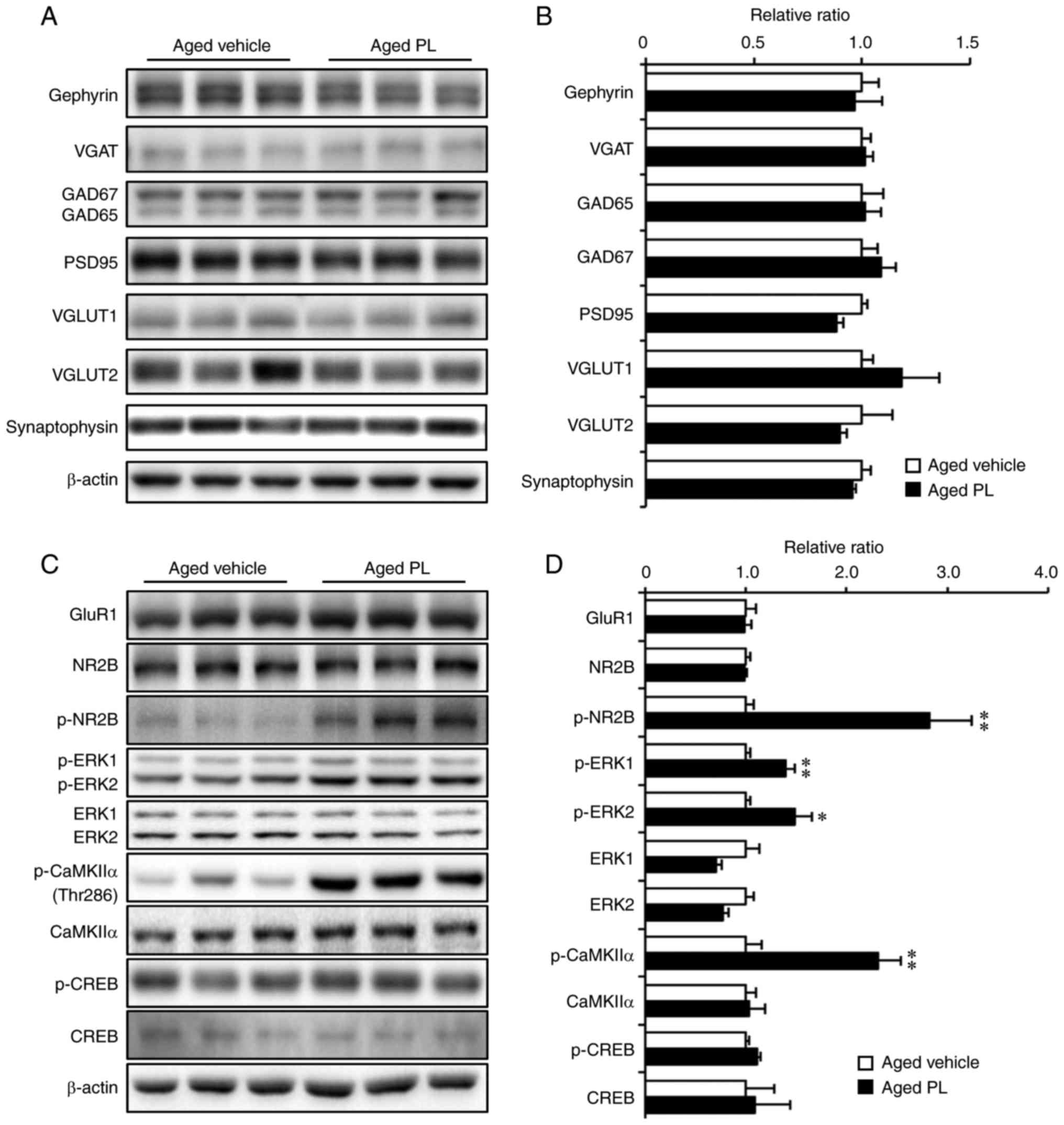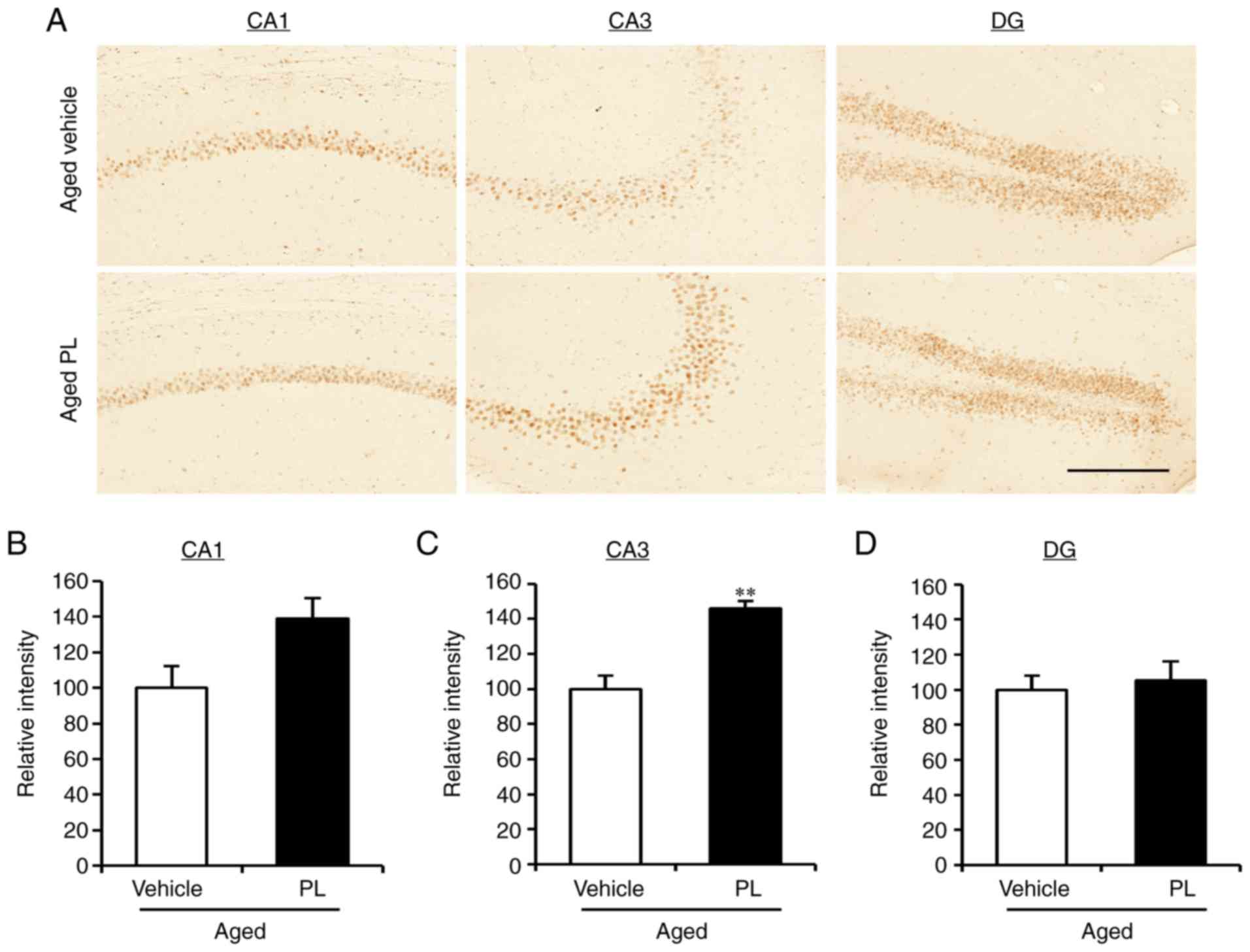|
1
|
Morrison JH and Hof PR: Life and death of
neurons in the aging brain. Science. 278:412–419. 1997. View Article : Google Scholar : PubMed/NCBI
|
|
2
|
Bettio LEB, Rajendran L and Gil-Mohapel J:
The effects of aging in the hippocampus and cognitive decline.
Neurosci Biobehav Rev. 79:66–86. 2017. View Article : Google Scholar : PubMed/NCBI
|
|
3
|
Aaboe K, Knop FK, Vilsboll T, Vølund A,
Simonsen U, Deacon CF, Madsbad S, Holst JJ and Krarup T: KATP
channel closure ameliorates the impaired insulinotropic effect of
glucose-dependent insulinotropic polypeptide in patients with type
2 diabetes. J Clin Endocrinol Metab. 94:603–608. 2009. View Article : Google Scholar
|
|
4
|
Geinisman Y, Detoledo-Morrell L, Morrell F
and Heller RE: Hippocampal markers of age-related memory
dysfunction: Behavioral, electrophysiological and morphological
perspectives. Prog Neurobiol. 45:223–252. 1995. View Article : Google Scholar : PubMed/NCBI
|
|
5
|
Driscoll I, Howard SR, Stone JC, Monfils
MH, Tomanek B, Brooks WM and Sutherland RJ: The aging hippocampus:
A multi-level analysis in the rat. Neuroscience. 139:1173–1185.
2006. View Article : Google Scholar : PubMed/NCBI
|
|
6
|
Griffin R, Nally R, Nolan Y, McCartney Y,
Linden J and Lynch MA: The age-related attenuation in long-term
potentiation is associated with microglial activation. J Neurochem.
99:1263–1272. 2006. View Article : Google Scholar : PubMed/NCBI
|
|
7
|
Ojo JO, Rezaie P, Gabbott PL and Stewart
MG: Impact of age-related neuroglial cell responses on hippocampal
deterioration. Front Aging Neurosci. 7:572015. View Article : Google Scholar : PubMed/NCBI
|
|
8
|
Gureviciene I, Gurevicius K and Tanila H:
Aging and alpha-synuclein affect synaptic plasticity in the dentate
gyrus. J Neural Transm (Vienna). 116:13–22. 2009. View Article : Google Scholar
|
|
9
|
Lister JP and Barnes CA: Neurobiological
changes in the hippocampus during normative aging. Arch Neurol.
66:829–833. 2009. View Article : Google Scholar : PubMed/NCBI
|
|
10
|
Nyffeler M, Zhang WN, Feldon J and Knuesel
I: Differential expression of PSD proteins in age-related spatial
learning impairments. Neurobiol Aging. 28:143–155. 2007. View Article : Google Scholar
|
|
11
|
Bezerra DP, Pessoa C, de Moraes MO,
Saker-Neto N, Silveira ER and Costa-Lotufo LV: Overview of the
therapeutic potential of piplartine (piperlongumine). Eur J Pharm
Sci. 48:453–463. 2013. View Article : Google Scholar
|
|
12
|
Cícero Bezerra Felipe F, Trajano Sousa
Filho J, de Oliveira Souza LE, Alexandre Silveira J, Esdras de
Andrade Uchoa D, Rocha Silveira E, Deusdênia Loiola Pessoa O and de
Barros Viana GS: Piplartine, an amide alkaloid from Piper
tuberculatum, presents anxiolytic and antidepressant effects in
mice. Phytomedicine. 14:605–612. 2007. View Article : Google Scholar : PubMed/NCBI
|
|
13
|
Rodrigues RV, Lanznaster D, Longhi
Balbinot DT, de Gadotti VM, Facundo VA and Santos AR:
Antinociceptive effect of crude extract, fractions and three
alkaloids obtained from fruits of Piper tuberculatum. Biol Pharm
Bull. 32:1809–1812. 2009. View Article : Google Scholar : PubMed/NCBI
|
|
14
|
Raj L, Ide T, Gurkar AU, Foley M, Schenone
M, Li X, Tolliday NJ, Golub TR, Carr SA, Shamji AF, et al:
Selective killing of cancer cells by a small molecule targeting the
stress response to ROS. Nature. 475:231–234. 2011. View Article : Google Scholar : PubMed/NCBI
|
|
15
|
Rao VR, Muthenna P, Shankaraiah G,
Akileshwari C, Babu KH, Suresh G, Babu KS, Chandra Kumar RS, Prasad
KR, Yadav PA, et al: Synthesis and biological evaluation of new
piplartine analogues as potent aldose reductase inhibitors (ARIs).
Eur J Med Chem. 57:344–361. 2012. View Article : Google Scholar : PubMed/NCBI
|
|
16
|
Navickiene HM, Alécio AC, Kato MJ, Bolzani
VD, Young MC, Cavalheiro AJ and Furlan M: Antifungal amides from
Piper hispidum and Piper tuberculatum. Phytochemistry. 55:621–626.
2000. View Article : Google Scholar : PubMed/NCBI
|
|
17
|
Go J, Ha TKQ, Seo JY, Park TS, Ryu YK,
Park HY, Noh JR, Kim YH, Hwang JH, Choi DH, et al: Piperlongumine
activates Sirtuin1 and improves cognitive function in a murine
model of Alzheimer's disease. J Funct Foods. 43:103–111. 2018.
View Article : Google Scholar
|
|
18
|
Peng S, Zhang B, Meng X, Yao J and Fang J:
Synthesis of piper-longumine analogues and discovery of nuclear
factor erythroid 2-related factor 2 (Nrf2) activators as potential
neuroprotective agents. J Med Chem. 58:5242–5255. 2015. View Article : Google Scholar : PubMed/NCBI
|
|
19
|
Tabuneng W, Bando H and Amiya T: Studies
on the constituents of the crude drug 'piperis longi fructus'. On
the alkaloids of fruits of piper longum L. Chem Pharm Bull.
31:3562–3565. 1983. View Article : Google Scholar
|
|
20
|
Jang S, Dilger RN and Johnson RW: Luteolin
inhibits microglia and alters hippocampal-dependent spatial working
memory in aged mice. J Nutr. 140:1892–1898. 2010. View Article : Google Scholar : PubMed/NCBI
|
|
21
|
Park HY, Ryu YK, Kim YH, Park TS, Go J,
Hwang JH, Choi DH, Rhee M, Lee CH and Kim KS: Gadd45β ameliorates
L-DOPA-induced dyskinesia in a Parkinson's disease mouse model.
Neurobiol Dis. 89:169–179. 2016. View Article : Google Scholar : PubMed/NCBI
|
|
22
|
Park TS, Ryu YK, Park HY, Kim JY, Go J,
Noh JR, Kim YH, Hwang JH, Choi DH, Oh WK, et al: Humulus japonicus
inhibits the progression of Alzheimer's disease in a APP/PS1
transgenic mouse model. Int J Mol Med. 39:21–30. 2017. View Article : Google Scholar
|
|
23
|
Deacon RM, Cholerton LL, Talbot K,
Nair-Roberts RG, Sanderson DJ, Romberg C, Koros E, Bornemann KD and
Rawlins JN: Age-dependent and -independent behavioral deficits in
Tg2576 mice. Behav Brain Res. 189:126–138. 2008. View Article : Google Scholar : PubMed/NCBI
|
|
24
|
Kim YJ, Kang Y, Park HY, Lee JR, Yu DY,
Murata T, Gondo Y, Hwang JH, Kim YH, Lee CH, et al: STEP signaling
pathway mediates psychomotor stimulation and morphine withdrawal
symptoms, but not for reward, analgesia and tolerance. Exp Mol Med.
48:e2122016. View Article : Google Scholar : PubMed/NCBI
|
|
25
|
Ryu YK, Kang Y, Go J, Park HY, Noh JR, Kim
YH, Hwang JH, Choi DH, Han SS, Oh WK, et al: Humulus japonicus
prevents dopaminergic neuron death in 6-hydroxydopamine-induced
models of Parkinson's disease. J Med Food. 20:116–123. 2017.
View Article : Google Scholar : PubMed/NCBI
|
|
26
|
Ryu YK, Park HY, Go J, Choi DH, Kim YH,
Hwang JH, Noh JR, Lee TG, Lee CH and Kim KS: Metformin inhibits the
development of L-DOPA-induced dyskinesia in a murine model of
Parkinson's disease. Mol Neurobiol. 55:5715–5726. 2018. View Article : Google Scholar
|
|
27
|
Wesson DW and Wilson DA: Age and gene
overexpression interact to abolish nesting behavior in Tg2576
amyloid precursor protein (APP) mice. Behav Brain Res. 216:408–413.
2011. View Article : Google Scholar
|
|
28
|
Filali M, Lalonde R and Rivest S:
Subchronic memantine administration on spatial learning,
exploratory activity, and nest-building in an APP/PS1 mouse model
of Alzheimer's disease. Neuropharmacology. 60:930–936. 2011.
View Article : Google Scholar : PubMed/NCBI
|
|
29
|
Deacon RM, Croucher A and Rawlins JN:
Hippocampal cytotoxic lesion effects on species-typical behaviours
in mice. Behav Brain Res. 132:203–213. 2002. View Article : Google Scholar : PubMed/NCBI
|
|
30
|
Cribbs DH, Berchtold NC, Perreau V,
Coleman PD, Rogers J, Tenner AJ and Cotman CW: Extensive innate
immune gene activation accompanies brain aging, increasing
vulnerability to cognitive decline and neurodegeneration: A
microarray study. J Neuroinflamm. 9:1792012. View Article : Google Scholar
|
|
31
|
Harman D: Aging: A theory based on free
radical and radiation chemistry. J Gerontol. 11:298–300. 1956.
View Article : Google Scholar : PubMed/NCBI
|
|
32
|
Stebbings KA, Choi HW, Ravindra A and
Llano DA: The impact of aging, hearing loss, and body weight on
mouse hippocampal redox state, measured in brain slices using
fluorescence imaging. Neurobiol Aging. 42:101–109. 2016. View Article : Google Scholar : PubMed/NCBI
|
|
33
|
Cini M and Moretti A: Studies on lipid
peroxidation and protein oxidation in the aging brain. Neurobiol
Aging. 16:53–57. 1995. View Article : Google Scholar : PubMed/NCBI
|
|
34
|
von Bernhardi R, Eugenín-von Bernhardi L
and Eugenín J: Microglial cell dysregulation in brain aging and
neurodegeneration. Front Aging Neurosci. 7:1242015. View Article : Google Scholar : PubMed/NCBI
|
|
35
|
Lee SW, Clemenson GD and Gage FH: New
neurons in an aged brain. Behav Brain Res. 227:497–507. 2012.
View Article : Google Scholar :
|
|
36
|
Bharadwaj U, Eckols TK, Kolosov M,
Kasembeli MM, Adam A, Torres D, Zhang X, Dobrolecki LE, Wei W,
Lewis MT, et al: Drug-repositioning screening identified
piperlongumine as a direct STAT3 inhibitor with potent activity
against breast cancer. Oncogene. 34:1341–1353. 2015. View Article : Google Scholar
|
|
37
|
Balducci L and Ershler WB: Cancer and
ageing: A nexus at several levels. Nat Rev Cancer. 5:655–662. 2005.
View Article : Google Scholar : PubMed/NCBI
|
|
38
|
Salminen A, Ojala J, Kaarniranta K,
Haapasalo A, Hiltunen M and Soininen H: Astrocytes in the aging
brain express characteristics of senescence-associated secretory
phenotype. Eur J Neurosci. 34:3–11. 2011. View Article : Google Scholar : PubMed/NCBI
|
|
39
|
Campisi J: Aging, cellular senescence, and
cancer. Ann Rev Physiol. 75:685–705. 2013. View Article : Google Scholar
|
|
40
|
Wang Y, Chang J, Liu X, Zhang X, Zhang S,
Zhang X, Zhou D and Zheng G: Discovery of piperlongumine as a
potential novel lead for the development of senolytic agents. Aging
(Albany NY). 8:2915–2926. 2016. View Article : Google Scholar
|
|
41
|
Nichols NR, Day JR, Laping NJ, Johnson SA
and Finch CE: GFAP mRNA increases with age in rat and human brain.
Neurobiol Aging. 14:421–429. 1993. View Article : Google Scholar : PubMed/NCBI
|
|
42
|
Nakazawa T, Komai S, Tezuka T, Hisatsune
C, Umemori H, Semba K, Mishina M, Manabe T and Yamamoto T:
Characterization of Fyn-mediated tyrosine phosphorylation sites on
GluR epsilon 2 (NR2B) subunit of the N-methyl-D-aspartate receptor.
J Biol Chem. 276:693–699. 2001. View Article : Google Scholar
|
|
43
|
Lisman J, Schulman H and Cline H: The
molecular basis of CaMKII function in synaptic and behavioural
memory. Nat Rev Neurosci. 3:175–190. 2002. View Article : Google Scholar : PubMed/NCBI
|
|
44
|
Asrican B, Lisman J and Otmakhov N:
Synaptic strength of individual spines correlates with bound
Ca2+-calmodulin-dependent kinase II. J Neurosci.
27:14007–14011. 2007. View Article : Google Scholar : PubMed/NCBI
|
|
45
|
Giese KP, Fedorov NB, Filipkowski RK and
Silva AJ: Autophosphorylation at Thr286 of the alpha
calcium-calmodulin kinase II in LTP and learning. Science.
279:870–873. 1998. View Article : Google Scholar : PubMed/NCBI
|
|
46
|
Fang T, Kasbi K, Rothe S, Aziz W and Giese
KP: Age-dependent changes in autophosphorylation of alpha
calcium/calmodulin dependent kinase II in hippocampus and amygdala
after contextual fear conditioning. Brain Res Bull. 134:18–23.
2017. View Article : Google Scholar : PubMed/NCBI
|
|
47
|
Elgersma Y, Sweatt JD and Giese KP: Mouse
genetic approaches to investigating calcium/calmodulin-dependent
protein kinase II function in plasticity and cognition. J Neurosci.
24:8410–8415. 2004. View Article : Google Scholar : PubMed/NCBI
|
|
48
|
Krapivinsky G, Krapivinsky L, Manasian Y,
Ivanov A, Tyzio R, Pellegrino C, Ben-Ari Y, Clapham DE and Medina
I: The NMDA receptor is coupled to the ERK pathway by a direct
interaction between NR2B and RasGRF1. Neuron. 40:775–784. 2003.
View Article : Google Scholar : PubMed/NCBI
|
|
49
|
Kreusser MM and Backs J: Integrated
mechanisms of CaMKII-dependent ventricular remodeling. Front
Pharmacol. 5:362014. View Article : Google Scholar : PubMed/NCBI
|
|
50
|
Tully T, Bourtchouladze R, Scott R and
Tallman J: Targeting the CREB pathway for memory enhancers. Nat Rev
Drug Discov. 2:267–277. 2003. View Article : Google Scholar : PubMed/NCBI
|
|
51
|
Silva AJ, Kogan JH, Frankland PW and Kida
S: CREB and memory. Ann Rev Neurosci. 21:127–148. 1998. View Article : Google Scholar : PubMed/NCBI
|
|
52
|
Bach ME, Barad M, Son H, Zhuo M, Lu YF,
Shih R, Mansuy I, Hawkins RD and Kandel ER: Age-related defects in
spatial memory are correlated with defects in the late phase of
hippo-campal long-term potentiation in vitro and are attenuated by
drugs that enhance the cAMP signaling pathway. Proc Natl Acad Sci
USA. 96:5280–5285. 1999. View Article : Google Scholar
|
|
53
|
Gonzalez GA and Montminy MR: Cyclic AMP
stimulates somatostatin gene transcription by phosphorylation of
CREB at serine 133. Cell. 59:675–680. 1989. View Article : Google Scholar : PubMed/NCBI
|
|
54
|
Monti B, Berteotti C and Contestabile A:
Dysregulation of memory-related proteins in the hippocampus of aged
rats and their relation with cognitive impairment. Hippocampus.
15:1041–1049. 2005. View Article : Google Scholar : PubMed/NCBI
|
|
55
|
Hattiangady B, Rao MS, Shetty GA and
Shetty AK: Brain-derived neurotrophic factor, phosphorylated cyclic
AMP response element binding protein and neuropeptide Y decline as
early as middle age in the dentate gyrus and CA1 and CA3 subfields
of the hippocampus. Exp Neurol. 195:353–371. 2005. View Article : Google Scholar : PubMed/NCBI
|
|
56
|
Cowansage KK, Bush DE, Josselyn SA, Klann
E and Ledoux JE: Basal variability in CREB phosphorylation predicts
trait-like differences in amygdala-dependent memory. Proc Natl Acad
Sci USA. 110:16645–16650. 2013. View Article : Google Scholar : PubMed/NCBI
|
|
57
|
Yu XW, Oh MM and Disterhoft JF: CREB,
cellular excitability, and cognition: Implications for aging. Behav
Brain Res. 322:206–211. 2017. View Article : Google Scholar :
|
|
58
|
Fan X, Wheatley EG and Villeda SA:
Mechanisms of Hippocampal Aging and the Potential for Rejuvenation.
Ann Rev Neurosci. 40:251–272. 2017. View Article : Google Scholar : PubMed/NCBI
|
|
59
|
Encinas JM, Michurina TV, Peunova N, Park
JH, Tordo J, Peterson DA, Fishell G, Koulakov A and Enikolopov G:
Division-coupled astrocytic differentiation and age-related
depletion of neural stem cells in the adult hippocampus. Cell Stem
Cell. 8:566–579. 2011. View Article : Google Scholar : PubMed/NCBI
|
|
60
|
Morgenstern NA, Lombardi G and Schinder
AF: Newborn granule cells in the ageing dentate gyrus. J Physiol.
586:3751–3757. 2008. View Article : Google Scholar : PubMed/NCBI
|
|
61
|
Kempermann G, Gast D and Gage FH:
Neuroplasticity in old age: Sustained fivefold induction of
hippocampal neurogenesis by long-term environmental enrichment. Ann
Neurol. 52:135–143. 2002. View Article : Google Scholar : PubMed/NCBI
|
|
62
|
Herskovits AZ and Guarente L: Sirtuin
deacetylases in neurodegenerative diseases of aging. Cell Res.
23:746–758. 2013. View Article : Google Scholar : PubMed/NCBI
|
|
63
|
Michan S, Li Y, Chou MM, Parrella E, Ge H,
Long JM, Allard JS, Lewis K, Miller M, Xu W, et al: SIRT1 is
essential for normal cognitive function and synaptic plasticity. J
Neurosci. 30:9695–9707. 2010. View Article : Google Scholar : PubMed/NCBI
|
|
64
|
Sellner S, Paricio-Montesinos R, Spieß A,
Masuch A, Erny D, Harsan LA, Elverfeldt DV, Schwabenland M, Biber
K, Staszewski O, et al: Microglial CX3CR1 promotes adult
neurogenesis by inhibiting Sirt 1/p65 signaling independent of
CX3CL1. Acta Neuropathol Commun. 4:1022016. View Article : Google Scholar : PubMed/NCBI
|



















